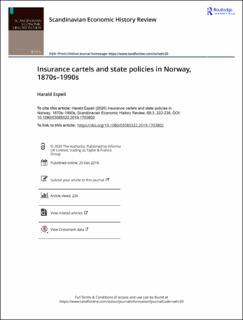Insurance cartels and state policies in Norway, 1870s–1990s
Journal article, Peer reviewed
Published version
Permanent lenke
https://hdl.handle.net/11250/2735096Utgivelsesdato
2019Metadata
Vis full innførselSamlinger
- Scientific articles [2181]
Originalversjon
Scandinavian Economic History Review. 2019, 68(3), 222-238. 10.1080/03585522.2019.1703802Sammendrag
This paper analyses the prolonged nature of two related cartels in life and non-life insurance, in Norway. Insurance cartels and the role of the state are rarely studied in cartel research, although such cartels are common. Cartels played an important role in creating trust and stability in the formative years of the Norwegian insurance industry. In life insurance, premiums are paid sometimes decades in advance. Reducing high transaction costs can also explain the state’s prolonged support of the fire and non-life insurance cartels. State policy towards the fire insurance cartel changed after World War I, when the state became a competitor, although its regulations did not directly weaken the non-life insurance cartel, this finally collapsed due to mergers in 1982. State support for the life insurance cartel was strong from the 1920s to the 1980s. By then it was difficult to differentiate between state-sector regulations and cartel interests. The life insurance cartel was dismantled by new state regulations in the mid-1980s.

